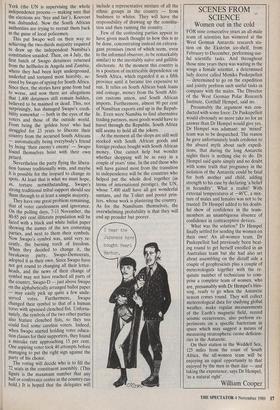SCENES FROM SCIENCE
Women out in the cold
FOR nine consecutive years an all-male team of scientists has wintered at the West German Antarctic research sta- tion on the EkstrOm ice-shelf, from February to December, performing use- ful scientific tasks. And throughout those nine years there was waiting in the wings a female scientist, a determined lady doctor called Monika Puskepelleit — determined to go on the expedition and jointly perform such useful tasks in company with the males. The Director of the West German Polar Research Institute, Gotthilf Hempel, said no.
Presumably the argument was con- ducted with some force: Dr Puskepelleit would obviously no more take no for an answer than Dr Hempel would give yes. Dr Hempel was adamant: no 'mixed' team was to be despatched. The reason he gave unfortunately lends credence to the absurd myth about such expedi- tions, that during the long Antarctic nights there is nothing else to do. Dr Hempel said quite simply and no doubt with some truth that pregnancy in the isolation of the Antarctic could be fatal for both mother and child, adding strength to his case by declaring 'a belief in fecundity'. What a realist! With external temperatures at —46°C, a mix- ture of males and females was not to be trusted: Dr Hempel added to his doubt- ful show of confidence in the team- members an unambiguous absence of confidence in contraceptive devices.
What was the solution? Dr Hempel finally settled for sending the women on their own! An all-women team. Dr Puskepelleit had previously been beat- ing round to get herself enrolled in an Australian team but she had also set about assembling on the distaff side a couple of geophysicists plus a couple of meteorologists together with the re- quisite number of technicians to com- prise a complete team of women, who are, presumably with Dr Hempel's bles- sing, ready to go when the Antarctic season comes round. They will collect meteorological data for studying global weather, make regular measurements of the Earth's magnetic field, record seismic occurrences, also perform ex- periments on a specific bacterium in space which may suggest a means of measuring stratospheric ozone deficien- cies in the Antarctic.
On their station in the Weddell Sea, 125 miles from the coast of South Africa, the all-women team will be enjoying an equal opportunity to that enjoyed by the men in their day --•- and taking the experience, says Dr Hempel, `as a natural right'.
William Cooper
















































 Previous page
Previous page